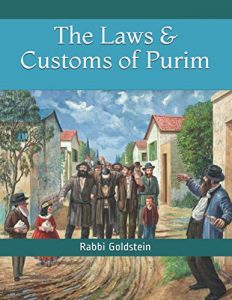Post Views: 965
*As an Amazon Associate I earn from qualifying purchases.
WhatsApp
Facebook
Twitter
Telegram
1. The month of Adar:
- Marbim Besimcha: One is to increase in joy throughout the month of Adar, starting from the first day of Rosh Chodesh Adar. One is to rejoice himself, his wife and children during this month similarly to that which is done on Yom Tov. Included in this Mitzvah is increasing in all matters that give one joy. Foremost one is to add in spiritual matters of joy, which is increasing in learning Torah, especially the inner dimension of Torah, and the scrupulous fulfillment of Mitzvos. One is to add in Simcha on every day of the month of Adar. This includes even the days after Purim, in which one is to increase his joy from one day to the next. During a leap year, the Mitzvah to increase in joy applies also in Adar Rishon.
- Court Case: One is to endeavor to have a court case involving a non-Jew arranged for the month of Adar.
- Zayin Adar: Moshe Rabbeinu was born and passed away on this day. One is to increase in joy on this day. Some are accustomed to fast. This is not the Chabad custom. However, one should increase in charity on this day in exchange for the fast. Some do not say Tachanun on this day. On a leap year, Moshe’s birthday and Yartzite are [Halachically] commemorated on the 7th of Adar I. However, the spiritual aspect behind the auspicious day applies to both 7th of Adar I and 7th of Adar II.
- The four extra Parshiyos: 1. Shekalim 2. Zachor 3. Para 4. Hachodesh. Parshas Shekalim is read on Shabbos Mevarchim Adar or, when applicable, on Shabbos Rosh Chodesh Adar.
- Parshas Zachor is a Biblical obligation and is read on the Shabbos before Purim.
- One must have in mind to fulfill the Biblical Mitzvah with the hearing of the reading.
- One reads first Zeicher and then Zecher.
- Many women have the custom to come to Shul for Parshas Zachor.
- Some say Parshas Para is a Biblical obligation. Women are not obligated to hear it. Parshas Hachodesh is always read the Shabbos following Parshas Para.
- Leap years-Birthdays, Bar Mitzvahs and Yartzites: Birthdays and Bar-Mitzvas are celebrated in the second Adar, unless one was born in Adar I. Some have received a directive from the Rebbe to celebrate the birthday twice, in Adar I and Adar II. One commemorates a Yartzite in the first Adar unless the person passed away in Adar II. [Some are stringent to commemorate the Yartzite also in the second Adar.]
2. The Purim attire
- One should wear Shabbos clothing throughout the day of Purim [starting from the previous night].
- It is accustomed to wear costumes on Purim. Children are accustomed to wear crowns on Purim and those who do so are blessed.
- It is accustomed on Purim to allow males to wear the clothing of females and vice versa. However many Poskim challenge this custom and thus practically one is not to do so. Some write it is to be avoided even by children. If it is recognizable that the person is a man or woman, and he or she merely wears a single clothing of the opposite gender, there is room to be lenient.
- Many Purim costumes contain Biblically forbidden Shatnez and according to all may not be worn.
3. Al Hanissim:
- One is to recite Al Hanissim both by night and day. It is recited within Birchas Hamazon during the Birchas Haaretz and within Shemoneh Esrei by Birchas Modim.
- If one did not recite Al Hanissim in Shemoneh Esrei he has nevertheless fulfilled his obligation and is not required to repeat the prayer. If he remembered before reciting Hashem’s name in the blessing of “Hatov Shimcha” then he is to return and recite Al Hanissim. This applies even if he already said Baruch Ata but did not yet say Hashem’s name. If, however, one has already recited Hashem’s name then he may not go back. In such a case there are opinions which say that if one has not yet concluded his prayer he is to recite it prior to the last Yehyu Leratzon said prior to taking three steps back.
- If one did not recite Al Hanissim in Birchas Hamazon he has nevertheless fulfilled his obligation. If he remembered before reciting Hashem’s name in the blessing of “Al Haaretz Veal Hamazon” then he is to go back to Al Hanissim. If, however, one has already recited Hashem’s name, then if one has not yet concluded Birchas Hamazon, he is to recite “Harachaman Hu Yaaseh Lanu Nissim Viniflaos Kemo Sheasa Laavoseinu Bayamim Haheim Bezman…Bimeiy Mordechai”, in the orders of Harachmans which are recited.
- If one began eating a meal during the day of Erev Purim and ended the meal at night, after Purim has begun, then if he ate a Kezayis of bread after nightfall he is to recite Al Hanissim in Birchas Hamazon. If the Purim meal extended into the night of Motzei Purim one is to nevertheless recite Al Hanissim in his Bentching. If one Davened Maariv prior to Bentching he no longer says Al Hanissim in Bentching.
- Al Hanissim is not recited on the 15th which is Shushan Purim [in areas that celebrated on the 14th]. Nevertheless, if one accidently recited it on the 15th he is not required to repeat the prayer.
- The inhabitants of Jerusalem which celebrate Purim on the 15th are to recite Al Hanissim only on the 15th and not on the 14th. The inhabitants of a city which celebrates Purim on both the 14th and 15th due to doubt are to say Al Hanissim on both days.



Leave A Comment?
You must be logged in to post a comment.